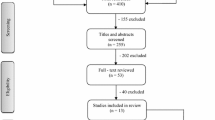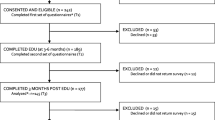Abstract
Purpose
Little is known about melanoma survivors’ long-term symptoms, sun protection practices, and support needs from health providers.
Methods
Melanoma survivors treated at Stanford Cancer Center from 1995 through 2011 were invited to complete a heath needs survey. We compared responses of survivors by sex, education, time since diagnosis (long-term vs. short-term survivors), and extent of treatment received (wide local excision (WLE) alone versus WLE plus additional surgical or medical treatment (WLE+)).
Results
One hundred sixty melanoma survivors (51 % male; 61 % long-term; 73 % WLE+) provided evaluable data. On average, patients were 62 years of age (SD = 14), highly educated (75 % college degree), and Caucasian (94 %). Overall, participants rated anxiety as the most prevalent symptom (34 %). Seventy percent reported that their health provider did not address their symptoms, and 53 % requested education about melanoma-specific issues. Following treatment, women spent significantly less time seeking a tan compared with men (p = 0.01), had more extremity swelling (p = 0.014), and expressed higher need for additional services (p = 0.03). Long-term survivors decreased their use of tanning beds (p = 0.03) and time spent seeking a tan (p = 0.002) and were less likely to receive skin screening every 3–6 months (p < 0.001) compared with short-term survivors. WLE+ survivors reported greater physical long-term effects than WLE survivors (p ≤ 0.001) following treatment.
Conclusions
Melanoma survivors experience continuing symptoms long after treatment, namely anxiety, and they express a need for information about long-term melanoma effects, psychosocial support, and prevention of further skin cancer.
Similar content being viewed by others
References
CDC (2013) Skin cancer rates by race and ethnicity 2013. Centers for Disease Control and Prevention, Atlanta, GA
Siegel R, Ma J, Zou Z, Jemal A (2014) Cancer statistics, 2014. CA Cancer J Clin 64(1):9–29
SEER (2013) SEER statistics cancer factsheets: Melanoma of the skin. National Cancer Institute, Bethesda, MD
Lin AY, Wang PF, Li H, Kolker JA (2012) Multicohort model for prevalence estimation of advanced malignant melanoma in the USA: an increasing public health concern. Melanoma Res 22(6):454–459
Engel J, Schlesinger-Raab A, Emeny R, Holzel D, Schubert-Fritschle G (2013) Quality of life in women with localised breast cancer or malignant melanoma 2 years after initial treatment: a comparison. Int J Behav Med
Schlesinger-Raab A, Schubert-Fritschle G, Hein R, Stolz W, Volkenandt M, Hölzel D, Engel J (2010) Quality of life in localised malignant melanoma. Ann Oncol 21(12):2428–2435
Rychetnik L, McCaffery K, Morton R, Irwig L (2013) Psychosocial aspects of post-treatment follow-up for stage I/II melanoma: a systematic review of the literature. Psychooncology 22(4):721–736
Kasparian NA, McLoone JK, Butow PN (2009) Psychological responses and coping strategies among patients with malignant melanoma: a systematic review of the literature. Arch Dermatol 145(12):1415–1427
Trask PC, Paterson AG, Hayasaka S, Dunn RL, Riba M, Johnson T (2001) Psychosocial characteristics of individuals with non-stage IV melanoma. J Clin Oncol 19(11):2844–2850
Brandberg Y, Bolund C, Sigurdardottir V, Sjoden P-O, Sullivan M (1992) Anxiety and depressive symptoms at different stages of malignant melanoma. Psychooncology 1(2):71–78
Bergenmar M, Nilsson B, Hansson J, Brandberg Y (2004) Anxiety and depressive symptoms measured by the Hospital Anxiety and Depression Scale as predictors of time to recurrence in localized cutaneous melanoma. Acta Oncol 43(2):161–168
Kelly B, Raphael B, Smithers M, Swanson C, Reid C, McLeod R, Thomson D, Walpole E (1995) Psychological responses to malignant melanoma. An investigation of traumatic stress reactions to life-threatening illness. Gen Hosp Psychiatry 17(2):126–134
Boyle DA (2003) Psychological adjustment to the melanoma experience. Semin Oncol Nurs 19(1):70–77
Lehto US, Ojanen M, Kellokumpu-Lehtinen P (2005) Predictors of quality of life in newly diagnosed melanoma and breast cancer patients. Ann Oncol 16(5):805–816
Atkinson TM, Noce NS, Hay J, Rafferty BT, Brady MS (2013) Illness-related distress in women with clinically localized cutaneous melanoma. Ann Surg Oncol 20(2):675–679
Holterhues C, Cornish D, van de Poll-Franse LV, Krekels G, Koedijk F, Kuijpers D, Coebergh JW, Nijsten T (2011) Impact of melanoma on patients’ lives among 562 survivors: a Dutch population-based study. Arch Dermatol 147(2):177–185
Oliveria SA, Shuk E, Hay JL, Heneghan M, Goulart JM, Panageas K, Geller AC, Halpern AC (2013) Melanoma survivors: health behaviors, surveillance, psychosocial factors, and family concerns. Psychooncology 22(1):106–116
Guimond S, Chatard A, Martinot D, Crisp RJ, Redersdorff S (2006) Social comparison, self-stereotyping, and gender differences in self-construals. J Pers Soc Psychol 90(2):221–242
de Nooijer J, Lechner L, de Vries H (2003) Social psychological correlates of paying attention to cancer symptoms and seeking medical help. Soc Sci Med 56(5):915–920
Clarke SA, Booth L, Velikova G, Hewison J (2006) Social support: gender differences in cancer patients in the United Kingdom. Cancer Nurs 29(1):66–72
Donner NC, Lowry CA (2013) Sex differences in anxiety and emotional behavior. Pflugers Arch 465(5):601–626
Nolen-Hoeksema S (2001) Gender differences in depression. Curr Dir Psychol Sci 10:173–176
Husson O, Holterhues C, Mols F, Nijsten T, van de Poll-Franse LV (2010) Melanoma survivors are dissatisfied with perceived information about their diagnosis, treatment and follow-up care. Br J Dermatol 163(4):879–881
Veloso AG, Sperling C, Holm LV, Nicolaisen A, Rottmann N, Thayssen S, Christensen RD, Lehmann Knudsen J, Hansen DG. (2013) Unmet needs in cancer rehabilitation during the early cancer trajectory–a nationwide patient survey. Acta Oncol 52(2):372–381
Rowland JH, Kent EE, Forsythe LP, Loge JH, Hjorth L, Glaser A, Mattioli V, Fosså SD (2013) Cancer survivorship research in Europe and the United States: where have we been, where are we going, and what can we learn from each other? Cancer 119(Suppl 11):2094–2108
Knobf MT, Ferrucci LM, Cartmel B, Jones BA, Stevens D, Smith M, Salner A, Mowad L (2012) Needs assessment of cancer survivors in Connecticut. J Cancer Surviv 6(1):1–10
Tambuyzer E, Van Audenhove C (2013) Is perceived patient involvement in mental health care associated with satisfaction and empowerment? Health Expect. doi:10.1111/hex.12052
McLoone J, Menzies S, Meiser B, Mann GJ, Kasparian NA (2013) Psycho-educational interventions for melanoma survivors: a systematic review. Psychooncology 22(7):1444–1456
McLoone JK, Watts KJ, Menzies SW, Barlow-Stewart K, Mann GJ, Kasparian NA (2013) Melanoma survivors at high risk of developing new primary disease: a qualitative examination of the factors that contribute to patient satisfaction with clinical care. Psychooncology 22(9):1994–2000
McLoone J, Watts KJ, Menzies S, Meiser B, Butow PN, Kasparian NA (2012) When the risks are high: psychological adjustment among melanoma survivors at high risk of developing new primary disease. Qual Health Res 22(8):1102–1113
Murdock A, Griffin B (2013) How is patient education linked to patient satisfaction? Nursing 43(6):43–45
Boyes AW, Girgis A, D’Este C, Zucca AC (2012) Prevalence and correlates of cancer survivors’ supportive care needs 6 months after diagnosis: a population-based cross-sectional study. BMC Cancer 12:150
White K, D’Abrew N, Katris P, O’Connor M, Emery L (2012) Mapping the psychosocial and practical support needs of cancer patients in Western Australia. Eur J Cancer Care (Engl) 21(1):107–116
Korner A, Coroiu A, Martins C, Wang B (2013) Predictors of skin self-examination before and after a melanoma diagnosis: the role of medical advice and patient’s level of education. Int Arch Med 6(1):8
Acknowledgments
The authors thank Katherine L. McGurk, BS for her work in administering the survey. This study was funded in part by NCI K07CA132916 (OP).
Conflict of interest
The authors declare no financial conflict of interest. The authors have full control of all primary data, and we agree to allow the journal to review these data if requested.
Author information
Authors and Affiliations
Corresponding author
Rights and permissions
About this article
Cite this article
Palesh, O., Aldridge-Gerry, A., Bugos, K. et al. Health behaviors and needs of melanoma survivors. Support Care Cancer 22, 2973–2980 (2014). https://doi.org/10.1007/s00520-014-2286-0
Received:
Accepted:
Published:
Issue Date:
DOI: https://doi.org/10.1007/s00520-014-2286-0




